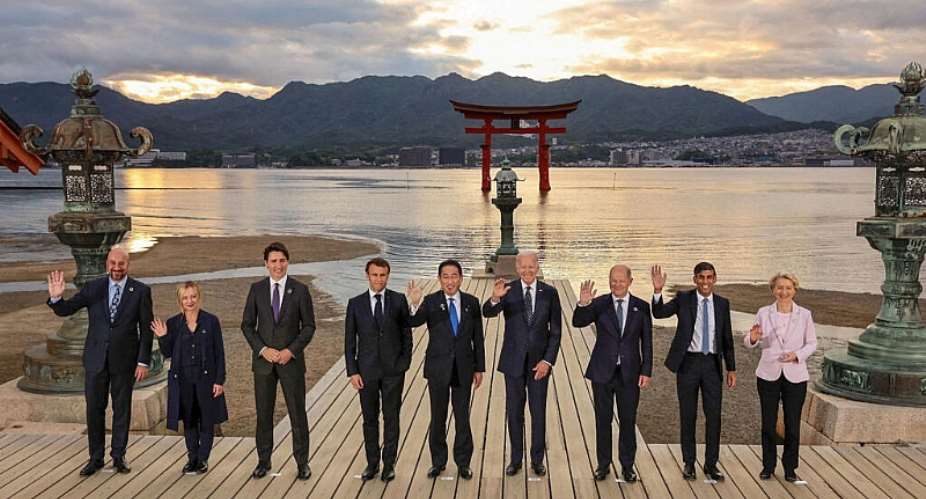Leaders from the Group of Seven nations agreed new sanctions on Friday intended to "starve Russia of G7 technology, industrial equipment and services that support its war machine".
The move comes after the United States, Britain and the European Union all announced fresh efforts to turn the screws on Moscow, 15 months into Vladimir Putin's invasion of Ukraine.
The bloc, meeting in the Japanese city of Hiroshima, said they would move to further restrict Russia's access to G7 economies.
The strategy is " designed to show Russia, certainly, and probably China, that they cannot divide and rule the West," says François Godement of the Paris-based thinktank Montaigne Instutute.
But the G7 is not completely aligned. Three G7 members – France, Germany and Italy – belong to the EU, and although they seem aligned on Russia with the US, UK, Canada and Japan, their policy vis-à-vis China seems more forthcoming.
The G7 is not "an alliance" says Godement, but was a body meant to deal with economic and public goods issues.
This does not include strategy.
The EU's policy has been to avoid direct confrontation with China given it is unlikely invade any part of continental Europe.
"European defensive measures are usually slow," says Godement. "Not necessarily very deep, not very proactive.
A lthough Brussels called China a "systemic rival" in 2019, and even put a major investment deal on hold, the sharp anti-China rhetoric issued by the US since the Trump administration has been largely avoided.
However the Russian invasion of Ukraine has changed things.
"China is in a team with Russia," says Godement. "China exercises pressure throughout the entire Western Pacific, if not the Indo-Pacific, but it's also exercising pressure on India.
"And China is a rising military power with a lot of technological ambitions in this field."
Defence interests
"S o we cannot treat the relationship as one that is based either only on the economy or only on value debates about political systems. There are now strategic issues."
Many EU economies have grown close to China. Italy hooked up with the Belt and Road Initiative, while Chinese companies have substantial stakes in German harbors and airports and there's an increasing Chinese presence in the Western Balkans and Greece.
Now it seems the EU and other G7 allies are willing to follow the most recent White House National Security Strategy published in October 2022, which designates Washington's main objective to be "out-competing China and constraining Russia".
It says Beijing has ambitions to "create an enhanced sphere of influence in the Indo-Pacific and to become the world's leading power".
US hegemony
The push for new alliances involving G7 members and their allies, like the Australia-UK-US (Aukus) partnership and the more informal Quad alliance between the US, Australia, India and Japan – with France and others as occasional participants – have fueled the propaganda machinery of Moscow and Beijing.
" The United States is piecing together small blocs through its alliance system. It has been forcing an "Indo-Pacific Strategy" onto the Asia-Pacific region, assembling exclusive clubs like ... the Quad and Aukus, and forcing regional countries to take sides," says a strongly worded report "US Hegemony and its perils" issued by China's Foreign Ministry in February.
But Godement disagrees.
"In these questions, there is always a debate on where is the action and where is the reaction," he says.
"While Russia maintains a NATO offensive has created the conditions for the war in Ukraine, and while China maintains that it's encircled, the West sees it the other way around."





 Akufo-Addo commissions Phase II of Kaleo solar power plant
Akufo-Addo commissions Phase II of Kaleo solar power plant
 NDC panics over Bawumia’s visit to Pope Francis
NDC panics over Bawumia’s visit to Pope Francis
 EC blasts Mahama over “false” claims on recruitment of Returning Officers
EC blasts Mahama over “false” claims on recruitment of Returning Officers
 Lands Minister gives ultimatum to Future Global Resources to revamp Prestea/Bogo...
Lands Minister gives ultimatum to Future Global Resources to revamp Prestea/Bogo...
 Wa Naa appeals to Akufo-Addo to audit state lands in Wa
Wa Naa appeals to Akufo-Addo to audit state lands in Wa
 Prof Opoku-Agyemang misunderstood Bawumia’s ‘driver mate’ analogy – Miracles Abo...
Prof Opoku-Agyemang misunderstood Bawumia’s ‘driver mate’ analogy – Miracles Abo...
 EU confident Ghana will not sign Anti-LGBTQI Bill
EU confident Ghana will not sign Anti-LGBTQI Bill
 Suspend implementation of Planting for Food and Jobs for 2024 - Stakeholders
Suspend implementation of Planting for Food and Jobs for 2024 - Stakeholders
 Tema West Municipal Assembly gets Ghana's First Female Aircraft Marshaller as ne...
Tema West Municipal Assembly gets Ghana's First Female Aircraft Marshaller as ne...
 Dumsor is affecting us double, release timetable – Disability Federation to ECG
Dumsor is affecting us double, release timetable – Disability Federation to ECG
